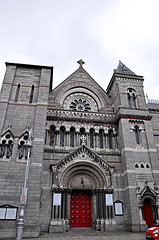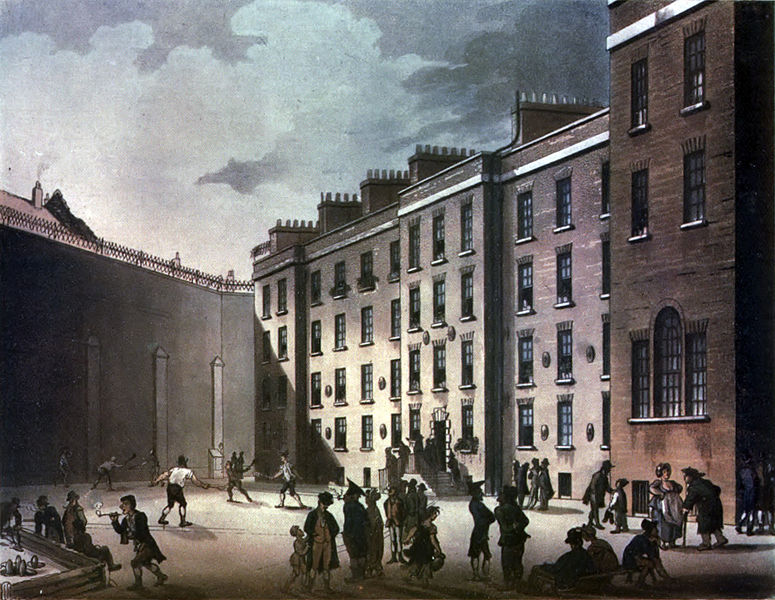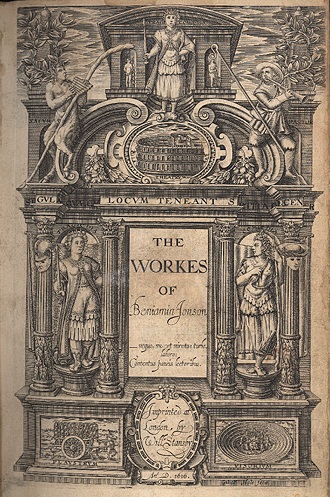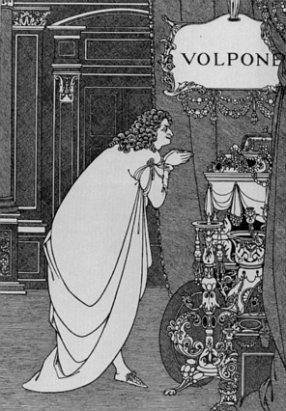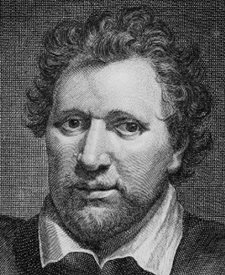
Jonson, Ben
Ben Jonson was a poet and playwright who was a contemporary of William Shakespeare. In fact, some argue that if there had been no Shakespeare, we would consider Jonson as our national bard. However, Jonson’s rise to fame and notability was not without struggle and controversy. His gritty determination and refusal to settle for second best saw him rise from obscurity to become the first poet laureate under patronage from King James.
Ben Jonson was born on 11th June 1572 in poverty. His father had been a minister but died two months before his birth. His mother remarried a bricklayer and they lived in Westminster, London. Ben was a studious child and read whenever he could. He won a scholarship from his local parish to the prestigious Westminster School where his teacher William Camden spotted his potential and encouraged his love of classical learning.
On leaving school Jonson was apprenticed to his stepfather’s trade but hated it. He joined the army and saw action in Flanders.
He returned to England in 1592 and joined Philip Henslowe’s theatre company, first as an actor before turning his hand to writing for the stage. He married Anne Lewis on 14th November 1592 and went on to have three children, all of whom died in childhood.
In 1597, he was imprisoned for writing a satirical play called The Isle of Dogs. The authorities considered it to be offensive but no one knows why. It was banned almost as soon as it was created and no copies of the play were allowed to exist.
The following year he had a disagreement in a pub with a fellow actor, Gabriel Spencer. They took their argument out to the fields at Shoreditch and duelled. Jonson killed Spencer and was tried for murder at the Old Bailey. He was convicted and sentenced to hang but claimed benefit of clergy which meant that he could read and write in Latin. This was nothing more than a legal loophole but one which Jonson’s sharp mind exploited to save his life. On release from prison he had his thumb branded with the mark of a felon and had to forfeit all his goods. He was broken and disgraced but before long he rose to his feet again.
He wrote many plays for the London stage including Every Man in His Humour, which featured William Shakespeare on its list of actors.
Jonson loved to write about the higher order topics such as justice, deceit, and identity. He referred to the classics in his writing and by doing this showed off his knowledge and learning. He also loved to satirise the other writers and thinkers of His day, making fun of them for their ideas. In comparison, Shakespeare who also went from acting to writing focussed more on creating interesting characters and plots. If they were both writing for our modern world today Shakespeare would be making EastEnders whilst Jonson would be writing Mock the Week. Shakespeare wrote for audience entertainment but Jonson used his writing to put his own opinions across and make a point.
Jonson also wrote beautiful lyric poetry which caught the attention of the upper classes and royalty. He began to receive commissions from lords, ladies, dukes and duchesses who asked for poems dedicated to themselves or their friends. This brought Jonson to the attention of the royal courts and he then began writing masques. A masque was a short play, often with music in which guests at an event would take part. These were very elaborate affairs and Jonson worked with a famous set designer named Inigo Jones.
He was the first playwright to have the idea of collecting all his works together in a folio. This was published in 1616 and he was appointed the first poet laureate by King James I. This meant that he was granted a pension to live on. It has been suggested that Jonson’s folio was the inspiration to collate Shakespeare’s works in the same way after his death in 1623.
In 1618 Jonson decided to visit Scotland as his ancestors came from the borders in Annandale. Being of an unusual disposition, Jonson made the journey entirely on foot! When he got there he stayed with William Drummond of Hawthornden. Drummond made records of their conversations which he later published. These provided a unique insight into the personality of Ben Jonson. Drummond found him to be complex. He was both sensitive yet given to being grumpy.
He told Drummond that he had seen a vision of his eldest son with a cross marked on his head. He was troubled by this but was reassured that it was only a dream. A few days later he received a letter from his wife with the news that his eldest son had died from the plague.
He wrote a touching poem about his son which again showed his sensitive side to the world:
Farewell, thou child of my right hand, and joy! My sin was too much hope of thee, loved boy.
It was during these conversations with Drummond that he famously said ‘Shakespeare wanted art’. He thought of himself as a scholar by referring to the classics and that Shakespeare was too ordinary. However, his relationship with Shakespeare was long-lasting and close. He might have had certain issues with his manner of writing, but he was in no doubt that Shakespeare had a unique talent, the likes the world had never seen before. A little later he complimented him by writing: ‘he was not of an age but for all time’, ‘Sweet swan of Avon’, and ‘soul of the age’. These are three of the heartfelt ways he refers to Shakespeare in his poem ‘To the Memory of My Beloved, The Author Mr Shakespeare’ which was the preface to Shakespeare’s first folio.
In 1619 Jonson was given an honorary degree from Oxford University. This must have been a wonderful moment for the ordinary boy who was destined to be a bricklayer.
Sadly in 1628 Jonson suffered a very bad stroke and was plagued by ill health afterwards. He struggled on and took great comfort from his friends. There was a group of fellow playwrights who used to meet in the Mermaid Tavern who referred to themselves as the Tribe of Ben. Now they attended to the man they had looked up to in his final years.
Ben Jonson died on 6th August 1637. He couldn’t afford a large plot in Poets Corner in Westminster Abbey, so he was buried with his coffin standing upright. A simple inscription reads ‘O rare Ben Jonson’. He truly was a rare man and a rare talent who we need to remember for his own merits, and not under Shakespeare’s shadow.
Find out more about Ben Jonson: http://www.guardian.co.uk/culture/jonson© ZigZag Education 2026: content may be used by students for educational use if this page is referenced.
| 1572 |
Born in Westminster, London
|
|
| 1592 |
Joined Philip Henslowe
|
|
| 1592 |
Married Anne Lewis in St Ann's Church, Dublin |
|
| 1597 |
Imprisoned for seditious writing |
|
| 1598 |
Killed fellow actor Gabriel Spenser in a duel
|
|
| 1616 |
Published a folio of collected works |
|
| 1616 |
Appointed first Poet Laureate by King James I
|
|
| 1618 |
Walked to Scotland from London
|
|
| 1618 |
First born son died from plague
|
|
| 1619 |
Received honorary degree from Oxford University
|
|
| 1628 |
Jonson had a severe stroke
|
|
| 1637 |
Jonson died
|


